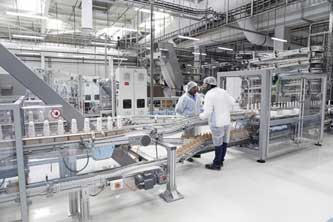|
|
UAE Freezones Biz News Updates
|
|
|
Unilever goes ‘Made in the UAE’ with factory in Dubai
 Unilever’s
factory will be pumping out 100,000 tonnes of liquid product a year when it
reaches full capacity by the middle of next year.
Unilever, the company behind brands such as Dove and Vaseline, expects to
start exporting products with a "Made in the UAE" label next year from its
new Dh1 billion factory, as global brands set up base in Dubai to tap
regional consumer spending trends.
The British-Dutch consumer goods company’s factory at Dubai Industrial Par,
the largest personal care facility for Unilever in the region, will export
about 80 per cent of the items produced at the facility to 80 countries in
the Middle East, North Africa and Europe.
It will produce 500 million items, or 100,000 tonnes of liquid product, a
year when it reaches full capacity by the middle of next year. That can
range from a 25 gram sachet of Fair and Lovely face cream to a 700ml
container of Dove shampoo. The factory will import raw materials from its
global and local vendors and manufacture packaged hair and skincare products
at the factory. Commercial production is expected to start next month at the
facility, which will employ 400 people.
Currently, these items are packaged at factories in Egypt, India, Europe and
Saudi Arabia.
Unilever already has another factory in Jebel Ali that packages tea. Built
in 2002, it is its largest tea-packaging facility in the world.
Global consumer goods companies are pumping billions of dollars in
investment into the Middle East to tap the growth opportunities offered by
young populations and rising levels of spending in many countries.
The food and retail sectors are benefiting most from this trend. Nestle
opened a Dh500 million factory in Dubai in 2010, which manufactures products
such as Kit-kat; Mars also opened a $40m factory in Dubai the same year.
The beauty and personal care products market in the UAE is expected to grow
to $2.72bn in 2020 from $2.15bn this year, according to research by
Euromonitor International.
German company Beiersdorf’s brand Nivea, Unilever’s Dove and the French
brand L’Oreal are among the top five beauty and personal care brands in the
Middle East and Africa (MEA) region, according to Euromonitor.
In the MEA region, the largest markets for the segment are Saudi Arabia,
Iran, the UAE and Egypt. In the Middle East and North Africa region, the
market is expected to grow to $24.39bn in 2020, up from $18.05bn this year,
according to the research company.
The Unilever factory will manufacture hair and skincare products under the
Dove, Fair & Lovely, Lifebuoy, Vaseline, Clear, TRESemme and Sunsilk brands.
The packaging will be imported from vendors in India and Saudi Arabia, but
many of them are expected to relocate to Dubai Industrial Park next year.
The factory will benefit from the free trade agreements between the UAE and
Mena countries.
About 25 per cent of the energy required at the plant will come from solar
power, and 80 per cent of waste water will be recycled, according to
Unilever.
In the third quarter, London and New York-listed Unilever’s turnover
declined by 0.1 per cent to €13.38bn. The personal care division, which is
its largest, grew by 0.9 per cent year on year with a turnover of €5.1bn.
The new Unilever factory spread over 100,000 square metres, a part of the
Dubai Wholesale City, is the 70th manufacturing facility at Dubai Industrial
Park.
"We expect to achieve 18 to 20 per cent growth in the number of companies,
revenues and profits in 2016," said Abdulla Belhoul, the chief executive of
Dubai Wholesale City.
"Manufacturing is the key to a sustainable future."
Currently, 108 factories are in the pipeline at Dubai Industrial Park in
various stages of construction and design, and are expected to come
on-stream in the next three years, Mr Belhoul said. He was speaking on the
sidelines of the inauguration of the factory.
December 21, 2016
|
| |
Courtesy The National
|
|

